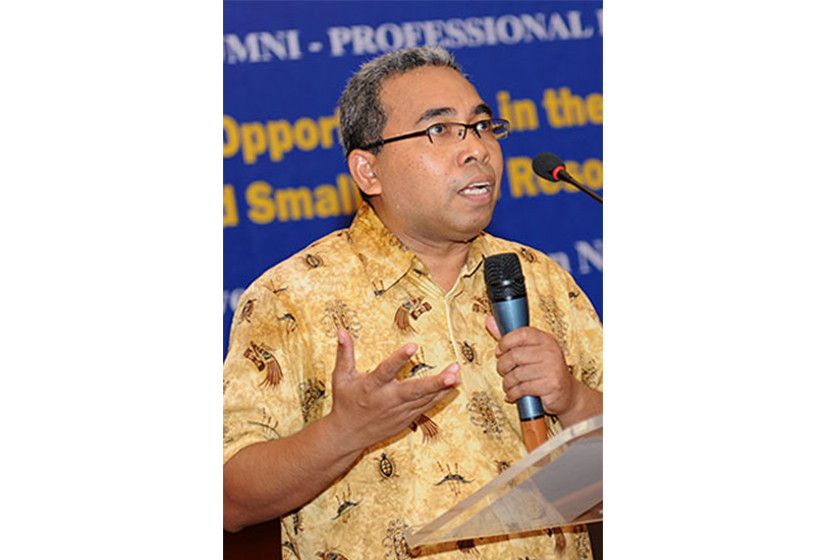
16 June 2025
Syukriah Rusydi: Weaving Heritage and Vision into Global Fashion
In the glittering, trend-driven world of international fashion, it's rare to stand out by stayin... Read more
The Australia Awards are prestigious, transformational scholarships and short courses offered to emerging leaders for study, research and professional development in Australia

19 April 2016
 Rebuilding a Research Centre Post-conflict
Rebuilding a Research Centre Post-conflict
Deciding to pursue a science degree in Fisheries when having to choose which path to take at the end of his first year at Institut Pertanian Bogor (Bogor Agricultural Institute), Dr Augy Syahailatua remembers eating fish every day while growing up in Ambon. A vast coastline and centre for the marine and fishery resources management program make Ambon, in the eastern Indonesian Province of Maluku, a good reason for studying fishery sciences.
Dr Augy has not looked back since and has worked his way up to Director of the Centre for Deep Sea Research in Ambon. The centre for research was previously known as LIPI (the Indonesian Institute of Science) Marine Labs before its change to focus more on deep sea research in May 2014. When asked what his greatest challenge has been in his work, Dr Augy recounts how there were only 8 researchers still working at the Marine Labs upon his return to Ambon in 2002 after completing his PhD.
Sadly, the social conflict in 1999 – 2003 caused 42 of his colleagues to move from Ambon and take up positions as researchers in other LIPI Labs throughout Indonesia. Together with his fellow researchers, Dr Augy recruited many fresh graduates and by early 2012, there were 25 Researchers at the Marine Labs in Ambon.
Dr Augy was very instrumental in getting LIPI Marine Labs into the Coral Triangle Initiative Program and has been involved in renovating the once burnt down LIPI building into the Coral Triangle Initiative Information and Training Centre. His aim is to develop the Centre into a first class Centre meeting International Standards for Marine and Fisheries.
Dr Augy was working at the LIPI Research Centre for Oceanography in Ambon when in 1989 he was awarded an Australia Awards Scholarship (under EMSS) to undertake a Graduate Diploma in Biology at The University of New South Wales. Dr Augy soon made his mark at the University in Australia and continued to study a Masters in Marine Science graduating in 1993. His research on Pilchard Fishery in Australia was part of a collaboration between UNSW and the Australian Government and Dr Augy’s recommendations on how to make sure that the three populations of Pilchard he studied remain healthy are published in theAustralian Fisheries Atlas.
Dr Augy’s PhD in fishery oceanography was also under an Australia Awards Scholarship, and like his Masters, at UNSW. Dr Augy actively conducts research as shown by his two peer-reviewed International publications on larval fish in the Deep Sea Research Journal , 2011.
Though posed with many challenges in the Management of Coastal Zones, Marine and Small Island Resources in Maluku Province, Dr Augy finds his work very interesting and enjoys the day-to-day work in fisheries science. He is extremely grateful of the contacts that he made with other Researchers in Australian and worldwide during his periods of study in Australia. When he is faced with issues in his work and research at the LIPI Labs in Ambon, he is able to make contact with other professionals in Marine and Fisheries and ask for their advice.
Share this article on:
 Related Articles
Related ArticlesThis website uses cookies to improve your website experience. We may also use cookies to analyse website data so that we can improve our online services. To find out more visit our privacy policy.
